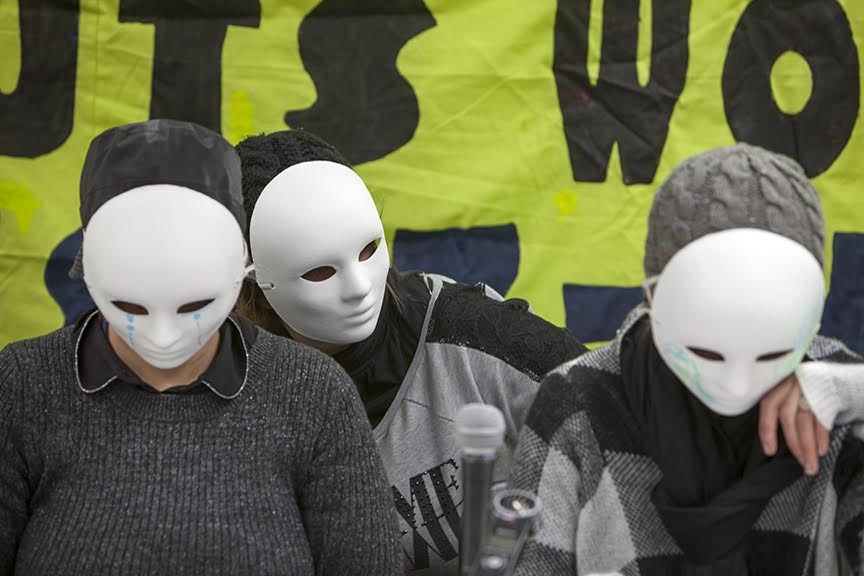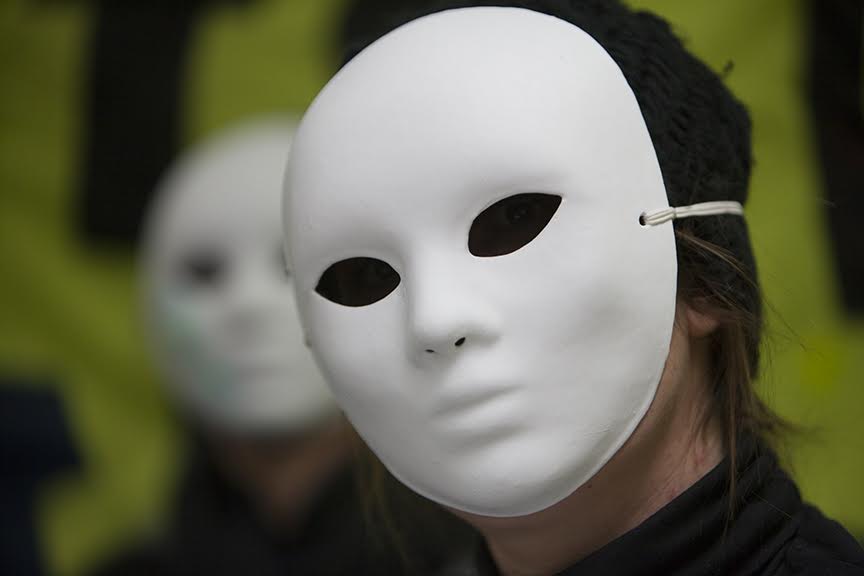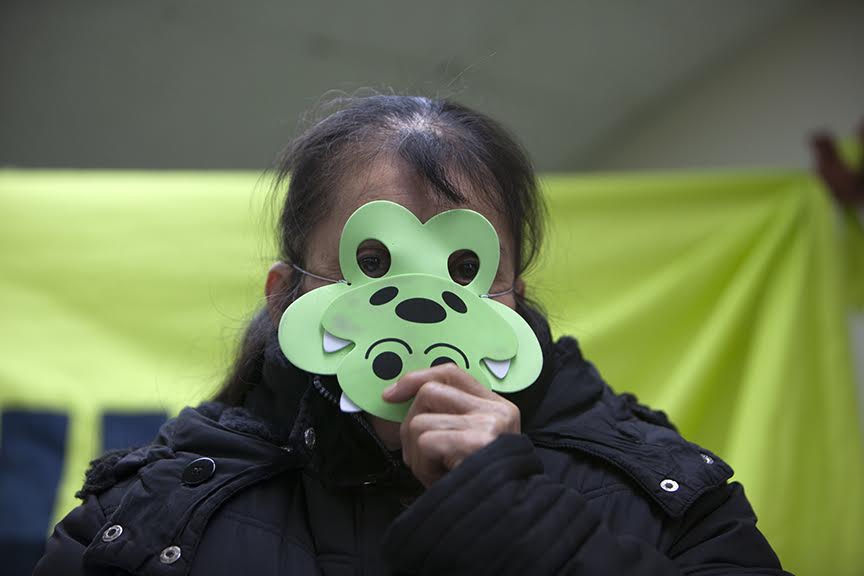Like this article? rabble is reader-supported journalism. Chip in to keep stories like these coming.
“The police arrested me for jaywalking. They handed me over to the Canadian Border Security Agency (CBSA), which locked me up for four days with many others at one of their detention centres. They threatened to deport me.”
Her voice breaking down in sobs, the diminutive woman spoke in Spanish, behind a doggy-faced green mask.
“A friend finally bailed me out, thankfully. Now she’s answerable for me. I must stay with her, I must report every week to Immigration Canada. My deportation is suspended pending my Pre-Removal Risk Assessment. But I can be deported any day.”
She had sat quietly behind the media, the mask covering her face, during the out-of-the-ordinary press conference convened by the Non-Status Women’s Collective of Montreal to highlight the dire plight of undocumented refugee claimants in Canada.
Masks and life in the shadows
Five women, all wearing white masks, faced the assembled media to read out an open letter delivered by the Collective to Prime Minister Justin Trudeau’s office in Montreal last November 27 asking him to take a stand “on the regularization of non-status people in Canada.”

“We are women and mothers who live and work in the shadows, invisible and excluded,” begins the text, which continues: “We work here. We contribute to the wealth of Canada. We clean your homes, serve you in restaurants, work on assembly lines, produce the food you eat. We pay taxes.”
“However, we are excluded from all social programs: education, health care, child benefits, daycare, unemployment insurance. We are among the most exploited people in society: we work long hours in very difficult conditions: we do not get minimum wage, we have no job protection, we are not unionized,” says the letter, before emphasizing:
“We who sign this letter are among tens or even tens of thousands of non-status people in Canada. Mr. Trudeau was elected in a Montreal riding where thousands of non-status people live. But officially we don’t exist.”
An underclass of at least 500,000 people
Indeed, estimates put the total of undocumented refuge-seekers in Canada at 500,000, probably more. These are women, men and children who live, work, study and agonize in the shadows — they form a reserve army of cheap labour who face a gauntlet of frustrating and exhausting red tape over many years, and who live in constant fear of arrest, family separation and deportation.
The masks worn at the press conference underlined not only life in the shadows for this huge chunk of humanity in our midst, but also the urgency to avoid identification in the media. Hence, no names were given, the proceedings were videotaped by the Collective itself, and the audio press was asked to disguise all voices before airing.
“I’m exhausted and depressed and I only cry when I think of the 10 years I have spent filling out forms and supplying documents to get a regular status in Canada, and of all the times I’ve been refused and all the times I’ve had to start filling forms and giving documents again and again,” said one of the women.
Non-persons fearing arrest and deportation
“I’ve managed to send my kids to school but we live in constant fear of discovery that we have no papers,” said another.
“My son was injured playing soccer and doctors asked for $7,000 to treat him. We had to borrow the money. We are lucky the doctors did not denounce us to the authorities,” said a third one.

“We are here for various reasons, but all of us faced unbearable problems in our home countries — domestic violence, sexual aggression, exploitation and repression. And we came here because Canada runs ads in our countries telling us how great a country it is. Now Canada is our country and we want to be recognized as real persons with full human and social rights,” another said.
Growing mobilization of Canadian civil society
Canadian civil society has been mobilizing to shed light on this dark side of our national life and to get the government to bring these courageous and enterprising people out of the shadows — at the very least in recognition of their valuable contribution to our economy and to our well-being.
The Canadian Council for Refugees (CCR) is one of the oldest organizations, founded in 1978 as an umbrella group of unions and churches. At the outset of 2000, labour groups in Toronto launched STATUS, a broad coalition of individuals and organizations, to lobby for blanket regularization.
The Montreal Non-Status Women’s Collective is one such initiative. No One Is Illegal is another. The Jesuit Social Justice Centre remains active in this field. And in 1985 in Singh v. Canada, the Supreme Court ruled that the Canadian Charter of Rights and Freedoms applied to persons who were not Canadian citizens, including refugee claimants.
“For years, we have filed endless documents in long and costly procedures; we have proven every aspect of our lives, over and over again. We are tired of… waiting for arbitrary decisions in fear and uncertainty. Some of us have degrees, some of us don’t; some have families, others are single, and we can’t leave. We don’t want to be judged on a case-by-case basis but simply accepted as human beings, equal to other members of society,” says the open letter to the prime minister.
Drawing hope from Trudeau’s statements
“Now many statements by Mr. Trudeau and Ms. Grégoire fill us with new hope. Maybe we are naïve to hope, but without hope we can’t live. Mr. Trudeau has said he ‘will take immediate steps to reopen Canada’s doors, and will make reuniting families a top priority.'”
“Opening the borders to immigrants, families and refugees is good news! If the government has the power and the will to bring in new people, it also has the power, and we dare to hope the will, to welcome us and reunite our families, we who have been working, volunteering, contributing to society, and raising our children here for years and are already integrated,” says the open letter signed by many non-status refuge claimants.
Recent figures are hard to come by. But on the CBSA web page, one reads that “as of the end of 2003, there were up to 200,000 illegal immigrants in Canada.” We also learn that “in fiscal year 2009-2010, 9,420 individuals were detained by the CBSA for immigration reasons.” And “in fiscal year 2008-2009, 13,249 individuals were removed from Canada.”
Jooneed J. Khan is a journalist and human rights activist based in Montreal.
Photo credit: Ion Etxebarria
Like this article? rabble is reader-supported journalism. Chip in to keep stories like these coming.




